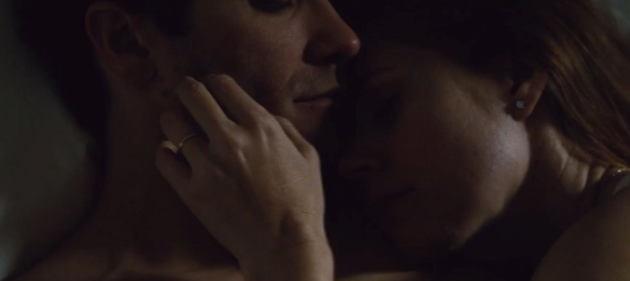“If you love someone, you work it out. You don’t just throw it away. You have to be very careful with it–you might not find it again.” So cautions Edward Sheffield (Jake Gyllenhaal) to his wife, Susan (Amy Adams), as she’s in the midst of breaking up with him. This is one of many flashbacks that haunts Susan as she reads a manuscript called Nocturnal Animals sent to her by Edward, a violent tale of a man who loses his wife and child to a trio of creepy crawlers (the Charles Manson term is all too applicable here) while driving down a deserted, abyssal highway in West Texas.
As Tom Ford’s second film since 2009’s A Single Man, it’s clear that the fast-forming auteur is careful with the projects he chooses to develop, this one also adapted from a novel–in this case Austin Wright’s 1993 release, Tony and Susan. Re-titled to Nocturnal Animals, Ford takes his time with unpacking the narrative–which is really three stories in one–opening on a carnival-like display of naked obese women representative of the sort of waking nightmare Susan exists in, though we soon realize it’s opening night at an L.A. gallery curated and owned by her. Clearly a powerhouse in her field, Susan has everything under control except her husband, Hutton (Armie Hammer), a blatant philanderer with little interest in keeping up the appearance of actually being interested in her.
At a party Susan hosts (the kind one imagines being thrown in the L.A. of the 60s or 70s) in which she confesses to a garish guest and confidante named Alessia Holt (Andrea Riseborough)–married to a gay artist, Carlos (Michael Sheen)–that even though Hutton is going broke she still often feels guilty for not being grateful enough for her good fortune. When the gathering is over, she is left on her own again, with Hutton jetting off to New York under the guise of potentially buying a painting but ultimately just having an affair. It is then that she takes up with Edward’s book, unable to sleep most of the time anyway–hence, Edward’s nickname for her, “nocturnal animal,” and according book dedication, “For Susan.”
She reads in fascination as the story begins with Tony Hastings (Gyllenhaal) taking his wife, Laura (Isla Fisher), and daughter, India (Ellie Bamber), on a road trip to Marfa, leading them through the empty, singalless roads of West Texas. On the way, they encounter the near urban legend horror of being harassed by three men, Ray (Aaron Taylor-Johnson), Lou (Karl Glusman) and Turk (Robert Aramayo), as they tailgate, pursue and sideswipe Tony’s car to the point of derailing him on the side of the road. This is around the moment Susan has to slam the book shut, a sinking sensation pervading her very core. And it isn’t just about the story–that the villain in it, Ray, who steals his wife and child, is intended to symbolize her–but that the heartbreak she caused him led him to write something this dark, this disturbing. Though she divorced him nineteen years ago, it is still this event–betrayal–that has colored his existence, determined the lonely and emotionally fraught course of the rest of his life.
In between cutting to Edward’s story, Ford also artfully intersperses flashbacks of how Susan first reconnected with Edward in New York, though the two were school friends in Texas. During their dinner together, Edward ironically comments, “You have the same sort of sadness in your eyes as your mother,” a “compliment” Susan instantly rebuffs as the last person she wants to be like in any way is Anne Sutton (Laura Linney).
Incidentally, it is Anne who warns Susan, “The things you call ‘bourgeois’ now are the things you’re gonna want later on,” when she informs her that she plans to marry Edward and move to Texas with him. His “career” as an aspiring writer is troublesome to Anne, aware that this falls into the category of the things that Susan loves about him now that she’ll hate in the future when he still hasn’t made anything of himself. But as Susan insists that she’s nothing like her self-important, money-obsessed mother, Anne also balks, “We all turn into our mothers eventually.”
And, much to Susan’s chagrin, Anne turns out to be right. As Susan continues with her grad school studies in art history while in Texas, she finds no talent in Edward’s writing, telling him that perhaps he should write about someone besides himself. This flashback is interrupted by the present, as Susan deals with the day-to-day of being an art gallery head honcho. Nonetheless, it’s evident Edward’s story is affecting her when one of her colleagues, Sage (Jena Malone, who has proven she’s a fantastic L.A. character [see: The Neon Demon]), shows her an app that lets her watch her child from her phone–again, L.A.–and Susan hallucinates Ray popping out from the crib.
As with A Single Man, the isolation of Los Angeles is a key factor in building unease throughout the film. Susan is constantly alone, with only this book as a portal into the outside world: Texas with its wide open spaces and clear skies. When she’s not suffering from insomnia at home, she’s at the gallery, passing by paintings that mean nothing to her anymore, save for one that reads simply: “REVENGE.” And yes, Nocturnal Animals is a revenge story that will resonate for any lover who has been left behind carelessly, expelled by the one he or she cared for in favor of something that was presumed to be better than true love.




















